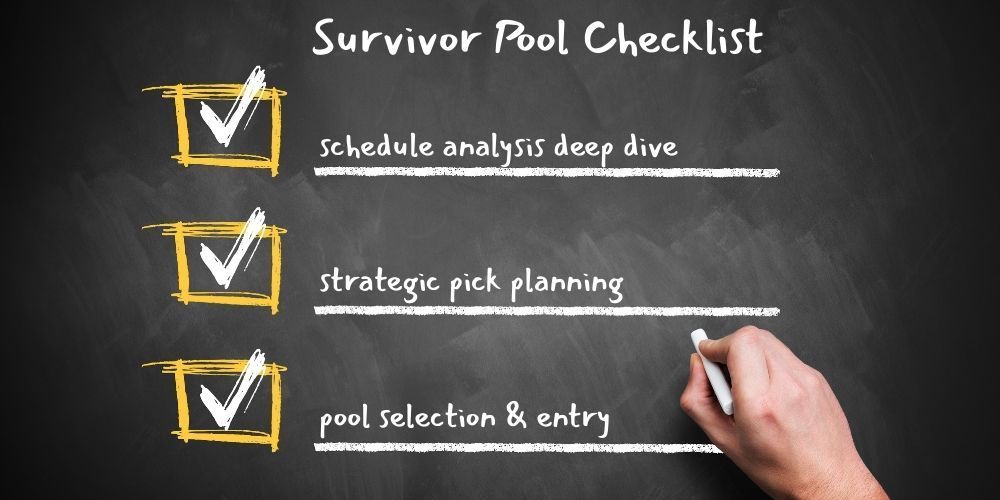Top 7 Strategies to Win Your NFL Survivor Pool
Survivor pools aren't just about picking winners each week. They're about resource management, strategic thinking, and understanding that one wrong move ends your season instantly. After analyzing thousands of
survivor pool entries and tracking what separates winners from early exits, these seven strategies consistently give players the best chance at lasting deep into January.

1. Save Your Premium Teams for Later in the Season
The biggest mistake casual players make? Burning through their best teams in September when the competition is still thick.
Premium teams like the Chiefs, Bills, Eagles, and 49ers should be treated like rare commodities. Using Kansas City to beat the Panthers in Week 2 might feel safe, but you're wasting their value when you could save them for a tough Week 14 spot when your options have dwindled.
The Premium Team Strategy
- Identify 4-6 "elite" teams before the season starts
- Only use them when you have no other viable options
- Prioritize using them at home over road games
- Save at least 2-3 premium teams for Weeks 13-18
Think of it like poker. You don't go all-in with pocket aces on the first hand when the blinds are small. You wait for maximum value. The same logic applies to survivor pools—your best teams provide maximum value when elimination pressure is highest.
2. Target Home Favorites Against Weak Opponents
Home field advantage in the NFL is real, especially for certain teams. Home favorites of 7+ points win roughly 75% of the time, making them excellent survivor pool targets when the matchup is right.
What makes a perfect home favorite pick
- Team coming off a bye week or extra rest
- Opponent dealing with key injuries or travel issues
- Historical dominance at home (think Packers at Lambeau in cold weather)
- Facing a team that struggles on the road
The sweet spot is finding teams that are big home favorites but aren't premium teams you need to save. Think Lions at home against the Cardinals, or Dolphins in Miami against a cold-weather team in December.
3. Avoid Divisional Games Early in the Season
Division rivals know each other too well. They've studied film, they're motivated by recent history, and strange things happen when familiar foes meet. The underdog covers at a much higher rate in divisional matchups compared to non-divisional games.
Why divisional games are dangerous
- Emotional motivation often trumps talent gaps
- Coaching staffs know each other's tendencies
- Players have personal rivalries and extra motivation
- Weather and travel advantages are minimized within divisions
Save divisional games for late in the season when you're desperate for options, or when there's a clear talent disparity (like a playoff team facing a rebuilding division rival in Week 17).
4. Follow the Sharp Money, Not the Public
In survivor pools, you want to avoid the most popular picks when possible. If 40% of your pool is taking the same team, you're not gaining any advantage by joining them. Worse, if that popular pick loses, you're eliminated alongside a huge chunk of the field.
How to identify contrarian value
- Track which teams the majority of your pool is avoiding
- Look for solid teams that are getting overlooked due to recent struggles
- Find teams with good matchups that aren't being hyped by media
- Use betting line movement to identify where smart money is going
The goal isn't to be contrarian just for the sake of it. It's about finding teams with similar win probability but lower ownership. If you can find a 75% chance team that only 5% of the pool is using instead of an 80% chance team that 35% is using, that's excellent value.
5. Manage Bye Weeks and Future Scheduling
Most pools die because players paint themselves into corners. You use the Rams in Week 3, then realize in Week 10 that you need them desperately but they're unavailable. Advanced planning prevents these scenarios.
Bye week strategy
- Map out bye weeks for your potential teams before the season
- Never use more than one team from the same bye week early in the season
- Keep a "bye week emergency team" available for difficult weeks
- Plan 3-4 weeks ahead, not just the current week
Create a simple spreadsheet tracking which teams you've used, when key teams have bye weeks, and potential future picks. This five-minute exercise can save your entire season.
6. Understand Trap Game Situations
Trap games kill survivor pool entries. These are games where a good team is favored but the situation is ripe for an upset. Learning to identify trap game scenarios is crucial for long-term survival.
Classic trap game setups
- Team coming off an emotional divisional win facing a "lesser" opponent
- Road favorites in prime time against desperate home underdogs
- Teams looking ahead to bigger games next week
- Favorites in weather conditions that favor defensive, low-scoring games
The key is recognizing when a team might not be fully motivated or prepared, even if they have superior talent. Sometimes the "safer" pick is the team that's only slightly favored but fully focused.
7. Have a Backup Plan for Every Pick
Never enter a week with just one option. Always identify 2-3 potential picks and rank them by preference. This gives you flexibility if news breaks about injuries, weather, or line movement.
Weekly preparation checklist
- Identify your top 3 picks by Wednesday
- Monitor injury reports through Friday
- Check weather forecasts for outdoor games
- Have a pivot plan if your preferred pick becomes unavailable
The best survivor pool players treat each week like a chess match. They're thinking multiple moves ahead and always have contingency plans. This preparation separates consistent performers from players who flame out due to poor planning.
Putting It All Together: Your Season-Long Approach
Successful survivor pool strategy requires balancing short-term safety with long-term asset management. Early in the season, prioritize solid-but-not-premium teams in favorable home spots. Save your best teams for November and December when options become scarce.
Track not just your own picks, but what the broader pool is doing. Look for opportunities to gain percentage points by making smart contrarian plays when the risk-reward makes sense.
Most importantly, remember that survivor pools are marathons, not sprints. The player who survives Week 15 with the Chiefs and Bills still available is in a much better position than someone who used them in September, even if they haven't been eliminated yet.
Advanced Tools and Resources
While these strategies can be executed manually, modern survivor pools often benefit from optimization tools that can model multiple weeks ahead and calculate complex probability scenarios. Apps like Spreadwise use algorithms to evaluate optimal paths through the season, considering factors like future scheduling, team strength, and elimination probabilities.
Whether you're using advanced tools or managing everything manually, these seven strategies form the foundation of successful survivor pool play. Master them, and you'll find yourself competing deep into January while others are watching from the sidelines.
What's the biggest mistake new survivor pool players make?
The most common mistake is using premium teams too early in the season. New players often panic in Week 2 or 3 and use the Chiefs or Bills in what feels like a "must-win" situation, only to desperately need those teams later when options are limited. The key is understanding that survivor pools are about resource management—your best teams are finite resources that provide maximum value when saved for difficult late-season spots. A good rule of thumb is to avoid using any of your top 4-5 teams before Week 8 unless you absolutely have no other viable options.
How many teams should I avoid using early to save for later?
Most successful players identify 5-6 "premium" teams before the season and aim to save at least 3-4 of them until after Week 10. This typically includes obvious powerhouses like the Chiefs, Bills, and Eagles, plus 2-3 other consistently strong teams like the 49ers, Ravens, or whoever emerges as top-tier. The exact number depends on your pool size and format, but having multiple premium options available for the final month of the season dramatically improves your chances of survival when most other players have exhausted their best teams.
Should I always avoid the most popular pick each week?
Not necessarily. Being contrarian just for the sake of it can be dangerous—sometimes the popular pick is popular because it's clearly the best option. However, you should definitely consider ownership percentages when picks have similar win probabilities. If 40% of your pool is taking Team A (80% win chance) and only 8% are taking Team B (75% win chance), Team B offers better strategic value. The goal is finding spots where you can take slightly more risk in exchange for significant strategic advantage. Avoid popular picks when you have viable alternatives, but don't force contrarian plays when there's a clear best option.
- Survivor Pool FAQ
- What Is an NFL Survivor Pool? A Beginner’s Guide
- NFL Survivor Pools Rules Explained Simply
- How NFL Survivor Pools Work (And Why They're So Fun)
- How to Create a Season-Long Survivor Pool Plan
- Top 7 Strategies to Win Your NFL Survivor Pool
- Adjusting Your NFL Survivor Pool Strategy Mid-Season










